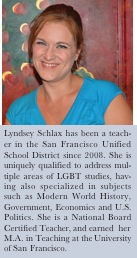 (Editor’s Note: Teacher Lyndsey Schlax of the Ruth Asawa San Francisco School of the Arts recently taught the nation’s first on-site high school LGBT course, according to district officials. She will resume teaching that groundbreaking class next fall. This semester, she is teaching a new Ethnic Studies course. It is a popular elective among the school’s Social Science offerings. In this column, students from her class will be anonymously sharing with the San Francisco Bay Times their thoughts about related matters, and what they are learning.)
(Editor’s Note: Teacher Lyndsey Schlax of the Ruth Asawa San Francisco School of the Arts recently taught the nation’s first on-site high school LGBT course, according to district officials. She will resume teaching that groundbreaking class next fall. This semester, she is teaching a new Ethnic Studies course. It is a popular elective among the school’s Social Science offerings. In this column, students from her class will be anonymously sharing with the San Francisco Bay Times their thoughts about related matters, and what they are learning.)
Student, 12th Grade
San Francisco has been my home for almost eighteen years and, over this time, I have had the ability to see its growth in full force. This “progress” has had its pros and its cons, creating beauty and destruction all throughout the Bay Area.
Thousands of families have been displaced from our metropolis, and what is to blame? There are many factors that have contributed to forcing citizens out of the homes they grew up in, but gentrification can be used as a broad term to describe this situation. Gentrification occurs in urban neighborhoods where lower income families or business owners lose their homes and establishments because they can no longer compete with their city’s rising property values.
Numerous neighborhood mom-and-pop stores have been bought out by the tech industry or by young, rich millennials who are looking to start their own venture capital efforts. Gentrification is not a new problem of the city, but this issue has become extremely prevalent in the past several decades in relation to the closing of the International Hotel on Kearny Street, the Occupy movement in the fall of 2011, the current problem of mass evictions in the San Francisco Mission District, and much more.
Thousands of families are facing eviction notices, displacement and, in some cases, homelessness. Although homelessness caused by gentrification might not have long lasting effects on every victim, no one should experience homelessness, regardless of income status. Vacant houses, empty apartments, and tent cities have been increasing in number, but San Francisco keeps raising property taxes. Is anyone noticing a trend? Our great city is facing tremendous change because of the lack of affordable housing, and this change isn’t good.
Inflation in housing costs has made living in the Bay Area almost impossible for low-to-middle income families. Close friends and families share their stories of having to move out of San Francisco completely in order to receive decent living conditions. An old classmate of mine also shared that his family of five was asked to give up half of their apartment space in order to compensate for the rise in their rent, leaving a closet-sized bedroom for five people to share.
Recently I discovered that my teacher/mentor was evicted from his home. He has a doctorate in music, teaches at universities, is a vital part of the Latin American and Filipino culture in the Bay Area, and has been lifelong resident of San Francisco. He had to permanently move back into his parent’s house because housing prices were completely unrealistic for a musician/teacher to afford. The situation for him has not changed in the past year, although this amazing educator has contributed so much to San Francisco.
Until this year, I had never considered the importance of discussing gentrification. This notion changed during my time in Ms. Schlax’s class. I have learned that we as humans need to remember to be empathetic toward others because the struggles of others are just as important and valid as yours. Although you may not be experiencing a similar situation, take other people’s experiences and thoughts into consideration. Gentrification affects us all, as well as the communities that we thrive in. We are losing the artistic souls of San Francisco. What can you do to make a difference?
For more information about the Ruth Asawa San Francisco School of the Arts, please visit http://www.sfsota.org/
Recent Comments